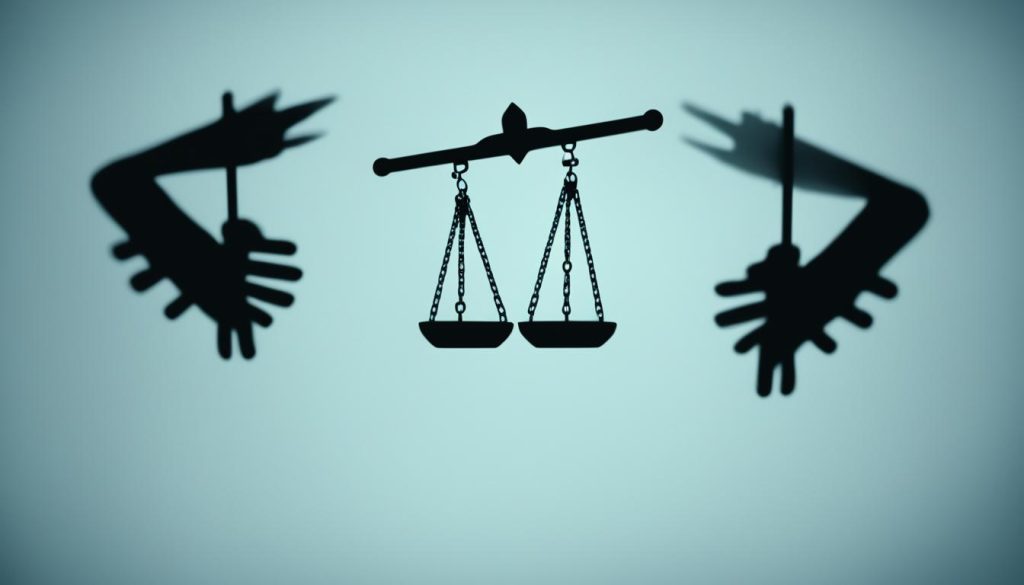Did you know that double homicide refers to the murder or unlawful death of two victims by one perpetrator? It is a grave criminal offense that involves intentionally causing the death of two individuals. Double homicide cases often involve complex motivations and circumstances, making them a subject of fascination and scrutiny.
Key Takeaways:
- Double homicide is the murder of two victims by one perpetrator.
- It is a serious criminal offense that can result in charges of murder or manslaughter.
- The classification of double homicide depends on the intent and circumstances of the crime.
- Double homicide cases can attract significant media attention due to their association with crimes of passion and notoriety.
- Differentiating between murder and manslaughter is crucial in double homicide cases to determine the appropriate charges and penalties.
Understanding Double Homicide in Canadian Law
Double homicide, within the context of Canadian law, refers to the tragic occurrence in which one person causes the death of two individuals. Often treated as two separate crimes, the accused is charged with two counts of homicide or murder. It is important to differentiate between murder and manslaughter in double homicide cases, as they hinge on the intent and circumstances surrounding the crime.
Murder, in the context of double homicide, entails the intentional killing of another person. On the other hand, manslaughter involves deaths resulting from negligence, recklessness, or other factors that do not involve premeditation. The court carefully examines the evidence and circumstances to determine the appropriate charges and potential penalties for the accused.
Distinguishing Murder and Manslaughter in Double Homicide Cases
Let’s delve further into the distinction between murder and manslaughter:
- Murder: Involves intentional killings with malice aforethought, demonstrating a deliberate plan or intent to cause harm.
- Manslaughter: Arises from actions that cause death without the intent to kill, often due to recklessness, negligence, or other non-deliberate factors.
It is important to note that first-degree murder charges are typically reserved for premeditated or heinous acts, while second-degree murder charges encompass intentional killings without certain aggravating factors. Manslaughter charges apply when the act is not deliberate, such as in cases of involuntary or voluntary manslaughter.
The court carefully considers the evidence and circumstances to determine the level of responsibility and potential penalties for the accused in double homicide cases.

| Homicide Classification | Description |
|---|---|
| Murder | The intentional killing of another person with malice or premeditation. |
| Manslaughter | Death resulting from negligence, recklessness, or other factors that do not involve premeditation. |
| Double Homicide | The murder or unlawful death of two individuals by one person, treated as two separate crimes. |
Double Homicide Cases: Crimes of Passion and Notoriety
Double homicide cases often attract significant media attention due to their association with crimes of passion and notoriety. These cases involve the tragic death of a spouse or romantic partner and their alleged lover at the hands of a jilted partner. The intense emotions and complex relationships involved in these cases make them captivating for the public and the media.
Double homicide can occur in various contexts, including love triangles and criminal activities. This type of crime has been depicted extensively in popular culture, with films, television shows, and books often exploring the depths of human emotions and the consequences of such fateful events.
Famous double homicide cases have left a lasting impact on society, revealing the dark side of relationships and highlighting the devastating consequences of actions driven by intense emotions. These highly publicized cases serve as reminders of the complexities and tragedies that can unfold when love, jealousy, and anger collide.

Double Homicide and Legal Considerations: Killing a Pregnant Woman
One legal and ethical debate surrounding double homicide concerns the killing of a pregnant woman and whether it can be charged as a double homicide. The issue revolves around the legal recognition of the fetus’s life and personhood. Some jurisdictions recognize the death of a pregnant woman and her unborn child as a double homicide, resulting in separate charges for each victim.
The interpretation of whether a developing fetus should be considered a person varies depending on various factors, including the state’s laws and the stage of fetal development. This topic has generated controversy and discussion, particularly in cases where the second victim is an unborn child.
| Arguments for Treating Killing a Pregnant Woman as Double Homicide | Arguments against Treating Killing a Pregnant Woman as Double Homicide |
|---|---|
|
|
Differentiating Double Homicide: Murder or Manslaughter
Differentiating between murder and manslaughter in double homicide cases is a crucial aspect of the legal process. Murder involves the intentional killing of another person, often with malice, while manslaughter is a result of negligence or other factors that do not involve premeditation. Prosecutors must establish the intent and motivation behind the crime to determine the appropriate charges.
First-degree murder charges typically apply to heinous or premeditated acts, while second-degree murder charges are less severe but still involve intentional killings. Manslaughter charges, on the other hand, indicate that the act was not deliberate, such as in cases of involuntary or voluntary manslaughter. The court carefully considers the evidence and circumstances to determine the level of responsibility and potential penalties for the accused in double homicide cases.